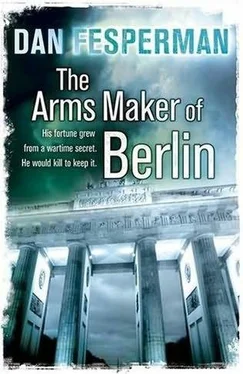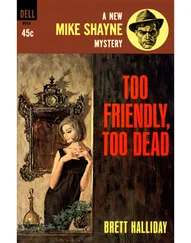Dan Fesperman - The Arms Maker of Berlin
Здесь есть возможность читать онлайн «Dan Fesperman - The Arms Maker of Berlin» весь текст электронной книги совершенно бесплатно (целиком полную версию без сокращений). В некоторых случаях можно слушать аудио, скачать через торрент в формате fb2 и присутствует краткое содержание. Жанр: Триллер, на английском языке. Описание произведения, (предисловие) а так же отзывы посетителей доступны на портале библиотеки ЛибКат.
- Название:The Arms Maker of Berlin
- Автор:
- Жанр:
- Год:неизвестен
- ISBN:нет данных
- Рейтинг книги:5 / 5. Голосов: 1
-
Избранное:Добавить в избранное
- Отзывы:
-
Ваша оценка:
- 100
- 1
- 2
- 3
- 4
- 5
The Arms Maker of Berlin: краткое содержание, описание и аннотация
Предлагаем к чтению аннотацию, описание, краткое содержание или предисловие (зависит от того, что написал сам автор книги «The Arms Maker of Berlin»). Если вы не нашли необходимую информацию о книге — напишите в комментариях, мы постараемся отыскать её.
The Arms Maker of Berlin — читать онлайн бесплатно полную книгу (весь текст) целиком
Ниже представлен текст книги, разбитый по страницам. Система сохранения места последней прочитанной страницы, позволяет с удобством читать онлайн бесплатно книгу «The Arms Maker of Berlin», без необходимости каждый раз заново искать на чём Вы остановились. Поставьте закладку, и сможете в любой момент перейти на страницу, на которой закончили чтение.
Интервал:
Закладка:
Then, as always happened to Nat on transatlantic trips, he found himself wide awake. The red digital display on the bedside clock said 3:19. It was his usual onset of Euro jet lag, and he knew from experience there wouldn’t be much more sleep until dawn. Berta, back on her home turf, still slept peacefully. He propped on an elbow to watch her, mildly aroused as he checked for any sign that she might soon join him in the waking world.
He thought of the verse Karen had offered, the one about forbidden fruit. Its taste was indeed sweet. What would his daughter make of him now, having succumbed so readily? Nat pictured her thumbing through the Complete Poems at top speed, searching for something appropriately salacious and disrespectful to sum him up. What time was it in the States? A little after 9 p.m. Good timing for a phone call, but the circumstances weren’t exactly optimal.
Looking again at Berta, he wondered about her love for her grandmother as the supposed motivator of her zealous research. According to the Wolfe-Turnbull school of historical thought, Berta’s explanation remained incomplete. Even assuming that her Oma had practically raised her and had taught her how to deal with Stasi bad guys, such generalities felt insufficient. There had to be some single big moment involved-a rescue, a failure, a near-death experience; take your pick. Nothing less would explain why a young woman as smart and pretty as Berta Heinkel had become such a single-minded vagabond in so narrow a field of research. And for fifteen years, no less.
Or was he misreading her? Maybe she had latched on to the topic only recently but had peddled the tale of lifetime obsession to win his allegiance. Other colleagues had certainly tried more underhanded tactics.
It was useless to just lie there, so he pulled on his trousers and went to the sink for a glass of water. Maybe he would go for a walk. He threw open the bathroom window for another look at the night. With the streets empty you could hear the river surging through a massive sluice gate. A lone car poked across the bridge.
What he really needed was a drink, something stronger than the dregs of the wine. He shuffled to the console cabinet and plunged into the minibar for a bourbon. Then he opened the refrigerator, hoping to retrieve some ice before the light awakened Berta. He shut the door, but not before the glow illuminated the edge of a manila folder atop the fridge, just beneath the shelf for the television. So far, Berta hadn’t shared the contents of either her briefcase or her camera. This might be a rare opportunity for a sneak peek.
He made sure she was still asleep. Then he took the folder, a pen, and a sheet of hotel stationery, slipped into the bathroom, and gently shut the door behind him. He turned on the light, flipped down the lid of the toilet and took a seat. Not exactly optimum conditions for research, but it would do.
The tab on the folder said “Plötzensee,” which he knew was a prison in Berlin during the war. The Nazis had often used it for political prisoners.
Inside was a typewritten sheet of names atop a stack of eight-by-ten photos in black and white. There were seven names on the list, next to two columns of dates. The first column was headed “Date of Incarceration.” The second, “Final Disposition.”
Was this, perhaps, a roster of members of the Berlin White Rose who had been arrested? If so, it was new ground indeed. No other historian had yet come up with this many names associated with the Berlin group.
The most interesting name was the first one: Kurt Bauer. Incarcerated March 20, 1943. Released September 3, 1943. Five and a half months in prison hardly seemed like evidence of betrayal, unless he had spilled his guts during interrogation. Even then, considering the Gestapo’s torture tactics, it certainly would have been forgivable for a teenage boy to break under pressure. More damning, perhaps, was that Bauer was the only one of the seven to be released.
The other six had also been incarcerated on March 20. Three of them-Dieter Büssler, Christoph Klemm, and Ulrich Lindner-were listed as “executed” on August 19, 1943. The fourth, Liesl Folkerts, was listed as “killed” on September 4, the day after Bauer’s release. The fifth, Hannelore Nierendorf, was listed as “escaped,” also on September 4. The sixth, Klara Waldhorst, was also executed, on September 12.
From his previous research, Nat knew of only three names besides Bauer’s that had been associated with the Berlin cell up to now-Helmut Hartert, Falk Harnack, and Jörg Strasser-and none of them was on this list.
Hartert was the only one of the three who was a Berliner. He had survived the war and, to Nat’s knowledge, had never been arrested. Harnack had communicated with the Berlin group as an emissary from the original Munich cell. He had apparently also visited Dietrich Bonhoeffer, the dissident cleric at the center of both of Nat’s books. Harnack had been arrested in a roundup of the Munich members, tried, and then released. Strasser, whose only apparent role was to transport a batch of White Rose leaflets to Berlin, had been questioned by the Munich Gestapo and released.
Nat supposed that any of those three might just as easily have betrayed the Berlin members as Bauer.
But when he reappraised this new information, Nat saw that the most intriguing name belonged to Hannelore Nierendorf, who had escaped. Might she still be alive? He aimed to find out. But he would have to do so without tipping off Berta, or else she would realize he had been rummaging through her papers. For all he knew, Berta had already interviewed the woman. He hurriedly copied the information onto the stationery.
There were no other documents in the folder, so he turned to the photos. The first, judging by the scenery, had been taken fairly recently. It was of an old man in a baggy dark overcoat clutching a small bouquet of flowers. His face seemed vaguely familiar, and he stood on a wide sidewalk before a high brick wall. There was some sort of historical marker in the background. Nat squinted to make out the lettering: “Gedenkstatte Plötzensee.”
Of course. The site of the infamous old prison was now a national memorial site. He then realized who the man was: Kurt Bauer. Nat had seen contemporary photos on the Internet.
Had Berta snapped it? If so, then she had probably followed him to the site, which struck Nat as a bit creepy. Maybe it happened the day she asked Bauer for an interview. But hadn’t Berta just told him that she had only tried contacting Bauer by mail? Nat turned over the photo. Berta had scribbled a date: “4 May 2007.” Less than a month ago.
The next photo was also of Bauer and was also taken at Plötzensee. Same overcoat, different lighting, different flowers and, on the back, a different date. “4 April 2007.”
There were three more shots of the elderly Bauer at Plötzensee. In two he glared at the camera as if he had recognized the person taking his picture. In each he held a bouquet. They had all been snapped on the fourth day of a different month the previous year.
Nat rechecked the roster of names. Every death except Liesl Folkerts’ had occurred on August 19 or September 12. Liesl died on September 4. Could she have been Bauer’s old flame? Judging from the flowers, Nat would bet on it. But why wasn’t she listed as “executed,” like all the others? The alignment of dates suggested she may have been shot while trying to escape with Hannelore Nierendorf. Perhaps Bauer had even been involved in the plot, since he had been released the day before and would have been in a position to help.
Interesting, all of it.
Berta’s doggedness in snapping the intrusive photos, on the other hand, was troubling, even by Nat’s standards. And the Plötzensee shots were only part of the story. There were seven more glossies in the file, and six were of Bauer. None was dated, but each looked recent: Bauer climbing into a limo outside an upscale town house; Bauer delivering a speech to a roomful of suits; Bauer at a posh restaurant; Bauer on a park bench reading an edition of Frankfurter Allgemeine Zeitung; Bauer again in a limo, this time while stopped at a traffic light; and finally, Bauer awaiting a flight at Tegel Airport in Berlin. Judging from the fuzzy images in the foreground, each photo had been shot through a long lens. The one at the airport had been snapped through a pane of glass. All of them had presumably been taken without his knowledge or consent.
Читать дальшеИнтервал:
Закладка:
Похожие книги на «The Arms Maker of Berlin»
Представляем Вашему вниманию похожие книги на «The Arms Maker of Berlin» списком для выбора. Мы отобрали схожую по названию и смыслу литературу в надежде предоставить читателям больше вариантов отыскать новые, интересные, ещё непрочитанные произведения.
Обсуждение, отзывы о книге «The Arms Maker of Berlin» и просто собственные мнения читателей. Оставьте ваши комментарии, напишите, что Вы думаете о произведении, его смысле или главных героях. Укажите что конкретно понравилось, а что нет, и почему Вы так считаете.












